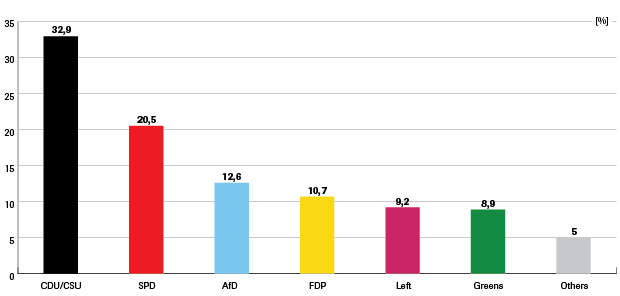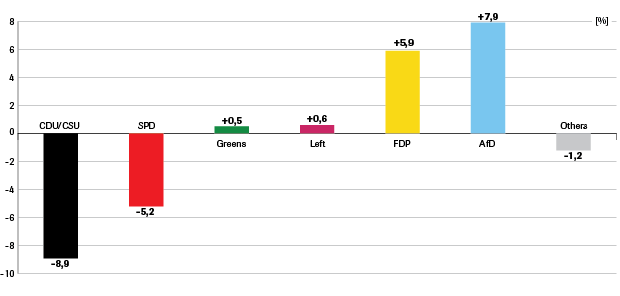Analyses
Germany after the parliamentary elections

The results of the elections
- The parliamentary elections in Germany have been won by the CDU/CSU, with 32,9% of the vote, their worst result since 1949; second place went to the SPD with 20.5%, which is their worst result since the end of World War II.
- The third force in the Bundestag now is Alternative for Germany (AfD), a party created four years ago, which has an anti-establishment, anti-immigrant and Eurosceptic position; they won 12.6% of the vote. Their presence in the Bundestag gives them the possibility to influence the public debate in Germany and build up their position.
- After four years’ absence, the liberals (FDP) return to the Bundestag with 10.7%. The other two parties which have won seats are the Greens (8.9%) and the post-Communist Left Party (die Linke) with 9.2%.
- Voter turnout was 76.2%. This is an increase of 4.7% compared to 2013.
- The election results allow two possibilities for coalition governments: either the continuation of the so-called ‘grand coalition’ of the CDU/CSU with the SPD; or a new constellation at the federal level, between the CDU/CSU, the FDP and the Greens (the ‘Jamaica’ coalition, so called because the colours of the three parties are those of the flag of Jamaica). In both scenarios, Angela Merkel would still be Chancellor, retaining the post she has held for 12 years.
- The SPD’s leader Martin Schulz has categorically ruled out the possibility of continuing in government with the Christian Democrats, and has announced that his party will move into opposition. In this situation, Chancellor Merkel will begin coalition talks with the Liberals and Greens. If such a coalition is agreed, it will not have a majority in the second chamber of parliament, the Bundesrat.
- It is likely that a government of the CDU/CSU, the FDP and the Greens will be inconsistent in its political programme, and will be vulnerable to criticism from both the left of the political spectrum (from the SPD and die Linke) and – which is a new phenomenon – from the right, in the form of the AfD as it grows in strength.
The prospects for the ‘Jamaican’ coalition
- The creation of a coalition between the CDU/CSU, the FDP and the Greens is favoured by a lack of alternatives, caused by the SPD moving into opposition; fatigue at governments made up of ‘grand coalitions’ (complaints about the lack of political debate, which benefited the AfD); and the three groups’ vast majority in the Bundestag; they will have a total of 393 seats in the 709-seat parliament.
- Any coalition between the CDU/CSU, the FDP and the Greens will be hindered by a great inconsistency between their political programmes as well as considerable personal animosities. The four groups will have to give up many of their electoral promises, and Angela Merkel will play the role of mediator in a conflicted government. This kind of ‘Jamaican’ coalition has no experience in governing at the federal level (although it did rule in the Saarland between 2009 and 2012, but collapsed for reasons of policy and personality clashes; and it has been governing in Schleswig-Holstein since June 2017).
- In the event of such a coalition assuming power, internal tensions should be expected in almost every important area ranging from the economy and the defence of the environment, through energy and European policy, up to security and defence, as well as migration issues.
- The participation of four groups with conflicting programmes means that it is difficult to currently predict how the cabinet positions will be assigned. It seems that the post of foreign minister may fall to Cem Özdemir (the Greens’ leader), and Christian Lindner (the head of the FDP) may receive the economy portfolio. The Ministry of Justice could be led by Wolfgang Kubicki (vice-president of the FDP). Katja Suding (vice-president of the FDP) has been mentioned as a candidate for minister of labour and social policy. Katrin Göring-Eckardt, co-chair of the Green party, could become minister of the environment.
- The likely foreign minister, Cem Özdemir, belongs to the right wing of the Green Party. He has advocated for the reactivation of the Weimar Triangle and Germany’s greater participation in the budget of the EU, and he supports the reforms proposed by the French President Emmanuel Macron concerning the EU. Özdemir wants to create a department within the Foreign Ministry which would deal with climate diplomacy, and would have competences which are currently assigned to the ministries of the economy and the environment. During the election campaign, he advocated for sanctions against Russia and sharply criticised Vladimir Putin, but also Donald Trump and the Hungarian prime minister Viktor Orban.
- As Vice-Chancellor, the FDP’s leader Christian Lindner will focus on the four issues which he discussed most often during the campaign: the centralisation of education, reducing taxes, domestic security and digitisation. If he becomes the minister for the economy, he will work against financial subsidies, a common euro-area budget, and taxes levied at the European level. He favours the immigration to Germany of skilled labour, while at the same time for the withdrawal of protection for Syrian refugees after the civil war in that country comes to an end.
- The ‘Jamaican’ coalition, like the other coalitions considered before the elections, will demand changes in European asylum policy, in order to divide the refugees in the EU into mandatory quotas, while also using this argument in negotiating the future financial framework of the EU. There are no differences between the four parties in this area.
- In principle, all the parties of the likely coalition are in favour of deepening cooperation within the EU at different speeds. The CDU/CSU’s plans for European policy were not clarified during the campaign; in this way, Merkel wants to leave herself broad room for manoeuvre in negotiations after the elections.
- For all four parties, the fundamental organisation for security in Europe is NATO. The greatest emphasis on NATO (as the alliance guaranteeing peace in Europe), and on relations between Germany & the EU with the USA, is placed by the CDU/CSU and the FDP. However, all the potential coalition’s parties have called for Europe’s capacities in security policy to be boosted by strengthening and integrating Europe’s armed forces and defence industries, reinforcing the common security and defence policies in the EU, and creating the so-called European Defence Union. We should thus expect the new government to support the existing initiatives within the EU, and to further strengthen its cooperation with France (particularly in the field of joint defence projects). Because of the scepticism of the FDP and the Greens about German participation in foreign missions, the new government may be less willing to send Bundeswehr forces abroad for crisis-management operations.
- Both the FDP and the Greens will probably continue the initiatives on arms control in the OSCE which were initiated by the Social Democrats. Both parties have also advocated for the withdrawal of American nuclear weapons from Germany.
- Both the CDU/CSU and the FDP will seek to raise defence spending to 2% of GDP by 2024, while simultaneously raising the budget for development policy. The increase in defence spending is opposed by the Greens, who would prefer to prioritise an increase in the budget of development policy. All the parties of the possible coalition favour the continued reinforcement of the eastern flank of NATO, while continuing dialogue with Russia in the NATO-Russia Council.
- One area of conflict will be European policy: the Greens, in contrast to the CDU and the FDP, favour making investments in social and environmental programmes at EU level (the so-called Green Pact for Europe); they have called for the creation of a European Monetary Fund, to be controlled by the European Parliament (in this case, the CDU might consent, but the FDP has rejected this idea). In European policy the FDP will oppose deep reform of the euro-zone, such as creating a common budget; like the CDU, they see such moves as beginning a process of mutualising debts. The FDP are demanding the introduction of regulations making it possible for member states in crisis to leave the euro zone.
- The Greens demand that sanctions against Russia be continued, and are the only party to indicate the need for the interests of the Central and Eastern European countries to be considered, for example in the case of the implementation of the Nord Stream 2 project. Despite a declared willingness to maintain sanctions against Russia, the FDP will look for an excuse to discuss their abolition in the name of the interests of their most important constituents, namely German business.
- The Greens also demand the acceleration of the energy transition process; by 2030 they want all German coal-fired power stations to be closed, as well as the introduction of a ban on the registration of petrol-run cars. This is opposed by both the Christian Democrats and especially the FDP.
- As during the CDU/CSU-FDP coalition in 2009-2013, the FDP will try to limit any ecological initiatives which could potentially jeopardise the interests of German industry. In its manifesto the FDP stated that they favoured lowering the German target to reduce greenhouse gas emissions to the minimum required by the EU; they are also opposed to closing coal-fired power plants on the basis of administrative decisions. This is the point which most clearly divides the FDP from the Greens, who are dogmatically committed to the protection of the environment.
- On the issue of Brexit, the FDP will bolster the economic lobby which gives top priority to reaching economic agreement with the UK; for the CDU and the Greens, the priority in the Brexit talks is to preserve the unity of the EU.
Written by OSW's Department for Germany and Northern Europe
Appendix
Results of 2017 elections to the Bundestag (percent)

Gains/ losses compared to the previous elections (2013)

Seats in the Bundestag

Voting shifts to AfD

Source: ZDF Television




